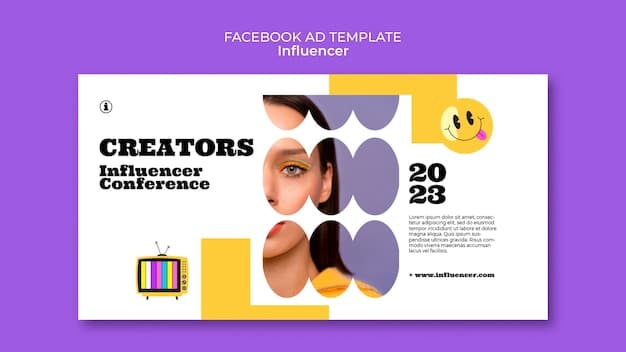Sponsored Post Scandals: Are US Influencers Really Disclosing Enough?

Sponsored post scandals involving US influencers raise concerns about adequate disclosure, challenging the authenticity of endorsements and potentially deceiving followers regarding the commercial nature of content.
The world of social media influencing has exploded, turning everyday individuals into powerful marketing tools. However, with this power comes responsibility, particularly when it comes to sponsored content. Are US influencers truly disclosing their partnerships and sponsorships in a way that’s clear and transparent to their audience? Or are sponsored post scandals: Are US Influencers disclosing enough, or are they deceiving their followers? becoming more prevalent, blurring the lines between genuine recommendations and paid promotions?
The Rise of Influencer Marketing and Its Ethical Quandaries
Influencer marketing has become a gigantic business, moving from a new advertising strategy into a mainstay for brands. By partnering with influencers — people who’ve built a following by sharing their lives and opinions online — brands gain access to a pre-built audience that presumably trusts the influencer’s recommendations. This brings with it a great number of ethical quandaries; foremost among them, disclosure.
The Power of Authentic Connection
Influencers succeed because they create a sense of authentic connection with their followers. People don’t just follow them for the products they promote, but for the lifestyles they embody and share. This sense of connection makes influencer recommendations more potent than traditional ads. However, this power is threatened if followers feel misled.
Blurred Lines: When Does a Post Become an Ad?
One of the most slippery slopes is determining when a post officially becomes an advertisement. Some influencers may receive products for free, others might be paid to mention a brand – at what point does the need for disclosure kick in? It’s also not as easy as slapping on a #ad hashtag, as many in the US influencer space have done.
- Transparency is vital for maintaining trust.
- Consumers are entitled to know when content is sponsored.
- Unclear disclosure can be deceptive and harm the influencer’s reputation.
Ultimately, the rise of influencer marketing hinges on trust. When this trust is broken by inadequate disclosure or outright deception, the entire industry suffers.

The FTC Guidelines on Influencer Marketing
Realizing the potential for deception, The Federal Trade Commission (FTC) has established guidelines to regulate influencer marketing & protect consumers. These guidelines are built around the single concept that endorsements must be truthful and not misleading. This includes disclosing any material connections between an influencer and a brand.
What Constitutes a “Material Connection?”
A “material connection” is any relationship that could affect the weight or credibility that consumers give to the endorsement. This includes not only monetary payment but also free products, discounts, or any business or family relationship.
Key Requirements of the FTC Guidelines
The FTC guidelines aren’t specifically aimed for any single demographic, however the guidelines underscore more specifically the need for clarity, prominence, and unambiguous disclosure. Influencers must make it obvious that they are being compensated for their posts.
- Disclosures must be clear and conspicuous.
- They should be placed where consumers will easily see them – not buried in a string of hashtags or at the end of a caption.
- The language used should be simple and easy to understand (e.g., #ad, #sponsored).
Brands are also expected to be proactive to make sure that influencers are conforming with guidelines, putting an extra layer of accountability into the world of internet partnerships.
Examples of Sponsored Post Scandals in the US
Unfortunately, the FTC’s guidelines haven’t prevented all **sponsored post scandals: Are US Influencers disclosing enough, or are they deceiving their followers?**. There have been a number of high-profile cases where influencers have been called out for failing to adequately disclose their partnerships. These examples spotlight the wide-ranging challenges involved with influencer transparency and the consequences of non-compliance.
Case Study 1: The Beauty Influencer Non-Disclosure
A prominent beauty influencer with millions of followers partnered with a skincare brand to promote a new line of products. While the influencer did mention the brand, there was no clear indication that the partnership was paid or sponsored, leading many followers to believe her glowing reviews were completely unbiased.
The Fallout and the Aftermath
After mounting pressure from consumer advocacy groups and concerned followers, eventually the influencer released a statement acknowledging the partnership, claiming ignorance of how the FTC guidelines work. Ultimately, this resulted in a lot of lost trust from followers, and put a huge dent in their credibility as a spokesperson for beauty and skincare products.
- Lack of disclosure erodes trust and damages an influencer’s brand.
- Consumers feel deceived when they discover a post was sponsored without proper notification.
- Brands associated with non-compliant influencers can suffer reputational damage.
Sadly, these cases illustrate a recurring theme: the pressure to maintain authenticity while chasing profits can lead some influencers to cut corners on disclosure, potentially damaging their relationship with their audience.
Why Influencers Might Not Disclose Properly
There are a lot of reasons why an influencer may not necessarily make appropriate disclosures, regardless of the regulations, guidelines, and public expectations that exist. These factors are usually rooted in a mix of ignorance, greed, and the pressure to maintain an image of authenticity.
Fear of Losing Authenticity
Some influencers fear that clearly labeling posts as sponsored will diminish their authenticity. The assumption is that followers will view these posts as less sincere and less trustworthy, leading to a decline in engagement. This fear is not unfounded, though transparency is critical to the long-term sustainability of an influencer’s career.
Lack of Education and Awareness
The world of influencer marketing is still relatively new, and many influencers, especially those who are newer to it or who have less formal training, may simply be unaware of the rules governing disclosures. This isn’t an excuse, but it highlights the dire need for better education and resources for influencers.

The Pressure from Brands
Sometimes, the non-disclosure comes from brands themselves. Some businesses could subtly (or not so subtly) discourage influencers from making clear disclosures, fearing that it will make their promotions seem less appealing. It is the influencer’s duty to resist such pressure and to adhere to ethical marketing strategies.
Ultimately, these reasonings highlight the ethical tightrope that influencers walk every day. They must balance their financial interests with the trust of their audience, making responsible disclosure a critical component of their success.
The Consequences of Misleading Disclosure
The fallout for influencers who engage in misleading disclosure practices can be severe, affecting everything from their reputation to their financial stability. The risks associated with not complying with FTC guidelines are a very strong incentive to be honest and above board.
Legal and Financial Penalties
While rare, the FTC has the power to fine influencers and brands that violate the endorsement guidelines. These fines are to discourage deceptive marketing on social media platforms, although it is hard to put any specific monetary number on it.
Damage to Reputation and Trust
Perhaps the most significant consequence is the damage to an influencer’s reputation and the trust they’ve built with their audience. Once trust is broken, it’s incredibly challenging to earn back. Followers who feel deceived are likely to unfollow, and brands may be hesitant to partner with influencers known for misleading practices.
An Example to Others
The public shaming and reputational damage resulting from disclosure failures can serve as a cautionary tale for other influencers. Seeing the negative consequences firsthand can encourage others to adhere to the FTC guidelines and prioritize transparency in their sponsored posts.
- Transparency builds trust and strengthens relationships with followers.
- Ethical marketing practices enhance an influencer’s credibility and long-term success.
- Compliance with FTC guidelines protects consumers and ensures fair competition in the marketplace.
Ultimately, transparency is the right choice, not only from an ethical viewpoint but also from a business point of view. It may take more effort at the start, however it sets the basis for long-term growth and genuine relationships with followers.
How Consumers Can Spot Deceptive Sponsored Posts
With the increase in **sponsored post scandals: Are US Influencers disclosing enough, or are they deceiving their followers?**, it is important for consumers to become more smart and skeptical on social media. Understanding how to identify deceptive sponsored content can help consumers make knowledgeable decisions and protect themselves from being misled.
Look for Disclosure Signals
The most basic step is to watch out for disclosure signals in posts. This includes hashtags such as #ad, #sponsored, or #partner in the captions. But, these signals can often be buried within strings of hashtags, making them much harder to spot. It is important be vigilant.
Evaluate the Product Reviews
Sincere reviews often offer a balanced view of a product, highlighting both its strengths and weaknesses. Be skeptical of reviews that are overwhelmingly positive or sound too sales-driven. Check out the influencer’s history – have they promoted similar products before? A diversity of reviews might indicate a genuine, rather than entirely sponsored.
Trust Your Gut
If something feels off about a post, trust what your senses are telling you. Has an influencer constantly promoted one brand, or has their tone changed when they started promoting the newest product? Even if there isn’t any concrete evidence of non-disclosure, it’s still helpful to use cautious judgment and to seek out secondary viewpoints before making a purchase.
By being proactive and informed, consumers can guard themselves from deceptive marketing practices and hold influencers accountable for their responsibility of transparency.
| Key Point | Brief Description |
|---|---|
| 📢 FTC Guidelines | Regulations requiring influencers to disclose material connections with brands. |
| 💰 Material Connection | Any relationship that could affect the credibility of an endorsement. |
| ⚖️ Consequences | Legal penalties, reputational damage, and lost trust. |
| 🔍 Spotting Deception | Look for disclosure signals and evaluate the context of product reviews. |
Frequently Asked Questions
▼
The FTC guidelines mandate that influencers clearly and conspicuously disclose any material connections with brands, such as payments or free products, to ensure their endorsements are transparent and not misleading.
▼
A “material connection” includes any relationship that could affect the weight or credibility consumers give to an endorsement, such as monetary payment, free products, discounts, or familial ties.
▼
Some influencers fail to disclose properly due to fear of losing authenticity, lack of knowledge about regulations, or pressure from brands to keep sponsorships less obvious.
▼
Consequences include legal and financial penalties from the FTC, damage to an influencer’s reputation and trust with their audience, and potential loss of brand partnerships.
▼
Consumers can look for disclosure signals like #ad or #sponsored, evaluate the balance and authenticity of product reviews, and trust their instincts when a post seems overly promotional or insincere.
Conclusion
The responsibility for making sure there is adequate disclosure in the influencer space rests on both the influencers and the brands they work with. It is essential to be upfront to keep your followers happy, while also holding influencers accountable for their transparency.





